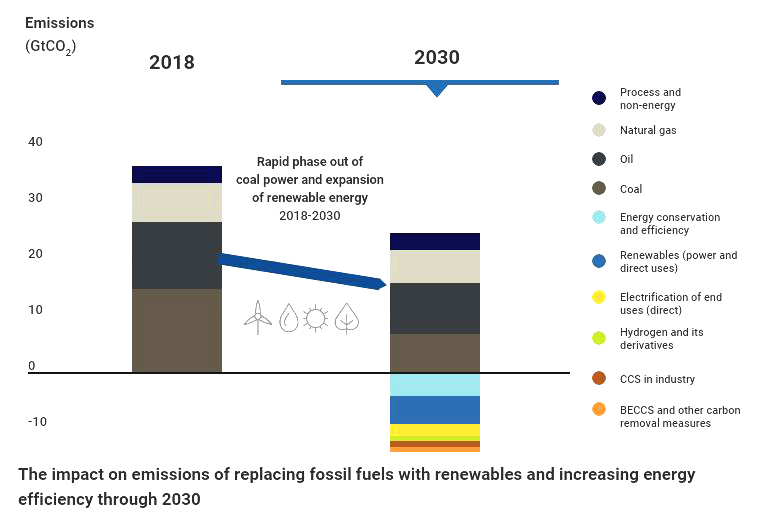Economy
World Energy Transitions Outlook 2022
- 31 Mar 2022
- 7 min read
For Prelims: World Energy Transitions Outlook 2022, IRENA, decarbonisation, Paris Agreement, Intergovernmental Panel on Climate Change, renewables, hydrogen, climate change
For Mains: Findings of the World Energy Transitions Outlook 2022 and issues
Why in News?
Recently, the International Renewable Energy Agency (IRENA) launched the World Energy Transitions Outlook 2022 at the Berlin Energy Transition Dialogue.
- The Berlin Energy Transition Dialogue (BETD) has become a leading international forum for key stakeholders of the energy sector.
What is Energy Transition?
- Energy transition refers to the global energy sector’s shift from fossil-based systems of energy production and consumption — including oil, natural gas and coal — to renewable energy sources like wind and solar, as well as lithium-ion batteries.
What is the Purpose of the Outlook?
- The Outlook sets out priority areas and actions based on available technologies that must be realised by 2030 to achieve net zero emissions by mid-century.
- It also takes stock of progress across all energy uses to date, which shows that the current pace and scale of the renewables-based transition is inadequate.
- It provides in-depth analysis of two areas particularly relevant for the decarbonisation of end-use sectors: electrification and bioenergy.
- It also explores the socio-economic impacts of the 1.5°C pathway (under Paris Agreement) and suggests ways to speed progress towards universal access to clean energy (renewable energy).
What are the Findings of the Outlook?
- Global annual additions of renewable power will triple by 2030 as recommended by the Intergovernmental Panel on Climate Change.
- At the same time, coal power will have to resolutely be replaced, fossil fuel assets phased out and infrastructure upgraded.
- The Outlook sees electrification and efficiency as key drivers of the energy transition, enabled by renewables, hydrogen, and sustainable biomass.
- End-use decarbonisation will take centre-stage with many solutions available through electrification, green hydrogen, and the direct use of renewables.
- High fossil fuel prices, energy security concerns and the urgency of climate change underscore the pressing need to move faster to a clean energy system.
What are the Recommendations?
- Short-term interventions addressing the current energy crisis must be accompanied by a steadfast focus on mid- and long-term goals of the energy transition.
- Renewables will have to scale-up massively across all sectors from 14% of total energy today to around 40% in 2030.
- The largest energy consumers and carbon emitters will have to implement the most ambitious plans and investments by 2030.
- Countries need to set more ambitious targets and implement measures to ramp up energy efficiency and deployment of renewables.
- To fulfill the 1.5°C Scenario, the electricity sector will have to be thoroughly decarbonised by mid-century, with solar and wind leading the transformation.
What is the International Renewable Energy Agency (IRENA)?
- It is an intergovernmental organisation, it was officially founded in Bonn, Germany, in January 2009.
- It has 167 members and India is the 77th Founding Member of IRENA.
- It has its headquarters in Abu Dhabi, United Arab Emirates.
What is the State of India’s Energy Transition?
- About:
- The country’s installed Renewable Energy (RE) capacity stands at 150.54 GW (solar: 48.55 GW, wind: 40.03 GW, Small hydro Power: 4.83, Bio-power: 10.62, Large Hydro: 46.51 GW) as on 30th Nov. 2021 while its nuclear energy based installed electricity capacity stands at 6.78 GW.
- India has the 4th largest wind power capacity in the world.
- This brings the total non-fossil based installed energy capacity to 157.32 GW which is 40.1% of the total installed electricity capacity of 392.01 GW.
- The country’s installed Renewable Energy (RE) capacity stands at 150.54 GW (solar: 48.55 GW, wind: 40.03 GW, Small hydro Power: 4.83, Bio-power: 10.62, Large Hydro: 46.51 GW) as on 30th Nov. 2021 while its nuclear energy based installed electricity capacity stands at 6.78 GW.
- At COP26, India announced that it will reach carbon neutrality by 2070 as part of a five-point action plan that included reducing emissions to 50% by 2030.
- Rank of India in the Energy Transition Index:
- India ranked 87 out of 110 countries in the Global Energy Transition Index (ETI) 2021, a benchmark by the World Economic Forum.
- Related Initiatives/Schemes:
- International Solar Alliance
- One Sun, One World, One Grid (OSOWOG).
- National Solar Mission.
- Pradham Mantri Kisan Urja Suraksha evam Utthaan Mahabhiyaan (PM KUSUM)
- Solar Park Scheme and Grid Connected Solar Rooftop Scheme
- National Wind-Solar Hybrid Policy 2018.
- Hydrogen Based Fuel Cells Vehicles
- Green Energy Corridor (GEC)
UPSC Civil Services Examination, Previous Year Questions (PYQs)
Q. Consider the following statements: (2016)
- The International Solar Alliance was launched at the United Nations Climate Change Conference in 2015.
- The Alliance includes all the member countries of the United Nations.
Which of the statements given above is/are correct?
(a) 1 only
(b) 2 only
(c) Both 1 and 2
(d) Neither 1 nor 2
Ans: (a)
EXP:
- International Solar Alliance (ISA) was launched at the United Nations Climate Change Conference in Paris in November 2015 by the Indian Prime Minister and French President. Hence, statement 1 is correct.
- At the initial stage ISA was opened to membership of countries lying fully or partly between the Tropics of Cancer and Capricorn (torrid zone). In 2018, the membership of ISA was opened for all the UN members. However, all the member countries of the UN are not its members. Hence, statement 2 is not correct.







